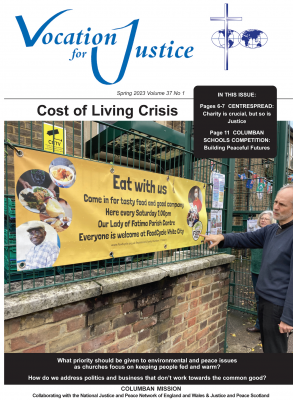Columban Newsletter: Cost of Living or Denial of Life crisis?

The cover of the Spring 2023 issue of the Columban newsletter Vocation for Justice is illustrated with a photo from White City Parish in Westminster Diocese. The parish has multiple initiatives for social justice and care of creation, including support of the local community by providing a weekly vegetarian meal and a 'Reduce, Reuse, Recycle' centre.
Attention to meeting local needs in the UK, as well as charitable and advocacy work for the global south is an increasing feature of justice and peace outreach. It is the focus of this issue of Vocation for Justice, which is produced by the Columban Justice, Peace and Ecology team.
Throughout the UK, church experience is revealing a huge 'cost of living' crisis. In Birmingham, Mauricio Silva, a Columban lay worker who coordinates Fatima House, which supports female asylum seekers, reported in January that, "we have increased the amount of the weekly allowance we distribute from our destitution fund and are redoubling efforts to appeal for donations of toiletries and basic food, which can help them save a little from their allowance." He said that, "among refugee friends, we have noticed that many are struggling to make ends meet and are having to make difficult decisions between feeding their families and paying bills."
Many Church foodbanks are linked to the Trussell Trust network and one in South London recently reported, "seeing a level of fear in people that we haven't seen before, in that, literally, they don't know what they're going to do to try and pay the bills and feed their families." The Trussell Trust delivered a letter to Downing Street just before Christmas, calling on the Prime Minister to ensure that everyone can afford food and all the essentials needed in life.
"The Catholic tradition has always insisted on justice as well as charity," says Raymond Friel, Director of the Catholic Social Action Network (CSAN), who writes on p3. CSAN's campaign, 'Cost of Living Crisis,' calls on the government to make urgent changes to the welfare and tax system for the benefit of the most vulnerable. The campaign also urges the government to work with the Catholic community and all other faith groups on a vision for a poverty-free country, in line with the UN's Sustainable Development Goal of 'No Poverty'.
The newsletter centrespread takes the title, 'Charity is crucial, but so is Justice.' And we must think globally too. The poorest half of the global population hardly owns any wealth, just 2% of the total. The richest 10% own 76%. It is shocking that recently released UK aid statistics show that UK aid to Fragile and Conflict-Affected States fell by 40% in 2021 from 2020. Solidarity with the poor everywhere is lacking.
This ties in with Columban social and environmental justice campaigns internationally.
The UK government's plan to go ahead with a new coal mine in Cumbria is just one example of a political failure to truly tackle the international climate crisis. Addressing the climate problem is fundamental to solving other problems. The Columbans in Pakistan can tell you that after severe weather and floods last year put a third of the country underwater. They are still distributing health kits and food to displaced communities living in tents, as well as campaigning on the climate crisis.
The newsletter reports on the work of Indian environmentalist Dr Vandana Shiva, who was so inspirational when she spoke at the annual conference of the National Justice and Peace Network 12 years ago. She said in January that she dislikes the phrase 'cost-of-living crisis'. In her view there is a "denial of life crisis". Speaking on diminishing biodiversity at January's Oxford Real Farming Conference she lamented injustices against small farmers and "corporate capture of governments". She felt faith communities have an important role to promote justice for the vulnerable and build a sustainable and just future.
On p5 you will see Columban feedback from December's COP15 UN Conference in Canada on Biodiversity. In the UK, 2022 was the hottest year since records began. We are now in the 'Anthropocene' era, one where the world is largely shaped by humans, and the negative impact on the planet caused by human behaviour has now reached crisis proportions. We must turn this, and growing inequality and poverty, around in every way possible. For example, in the UK, the cost of living and climate crises could be seriously tackled by investing in renewable energy, properly insulating homes and providing people with the skills and training needed to deliver a green energy revolution.
Pope Francis talked about a "fear of life" in a recent speech to the diplomatic corps in Rome. And his World Peace Day message of 1 January urged that we must, "heal our society and our planet, to lay the foundations for a more just and peaceful world." When we do this we are building hope. And earlier today, in his homily at an outdoor Mass in the strife-torn Democratic Republic of Congo, Pope Francis urged a commitment to justice and peace and warned that, "fatalism must not take hold of us."
The first snowdrops of Spring are appearing everywhere. They symbolise new beginnings, hope, rebirth and the ability to overcome challenges.
Ellen Teague is a member of the Columban Justice, Peace and Ecology team.
LINKS
Spring Vocation for Justice available at: https://columbans.co.uk/justice-peace/11916/columban-vocation-for-justice-newsletter-cost-of-living-crisis/
Sign up for the Columban Justice, Peace and Ecology Action for Justice Newsletter at: https://columbans.co.uk/how-you-can-help/subscribe/enewsletter/


















